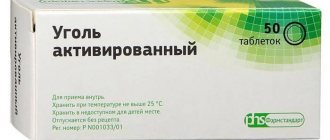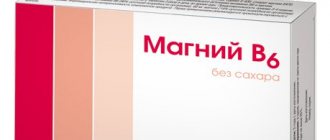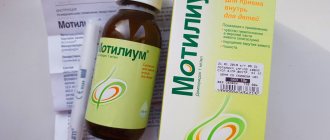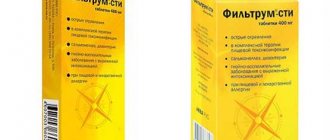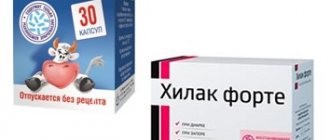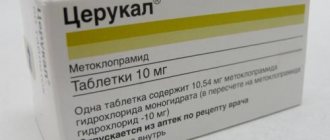Diarrhea is a symptom of many pathological conditions in the body. It occurs in diseases of the digestive system, poisoning, and acute infectious diseases. This symptom is dangerous, as it leads to rapid dehydration of the body, especially in children. Therefore, it is important to choose an effective remedy that will help eliminate intestinal upset in a short time. Phthalazole for diarrhea is recommended for both adult patients and children. The drug has no side effects, with the exception of rare allergic skin reactions .
Is phthalazole an antibiotic or not?
It is immediately worth noting that the drug in question belongs to the group of sulfonamides, and not antibiotics. Despite the fact that the mechanism of action of such drugs is similar (they are built into the structure of microorganisms and disrupt metabolic processes in their cells from the inside), Fthalazol is not an antibiotic drug. Yes, this is also an antimicrobial agent, but of a different group. These tablets have a more limited spectrum of action, which is why they have recently been forced out of the pharmacological market by more universal broad-spectrum antibiotics, but despite this, in some cases sulfonamides still remain relevant and the most effective.
Analogs
Until a few years ago, Phthalazol was the only remedy intended to eliminate diarrhea. Currently, the pharmaceutical market offers many types of drugs with similar effects. Despite this, doctors still prefer Phthalazol to other means due to its availability to all segments of the population. The cost of one package, as a rule, does not exceed 100 rubles.
Modern analogues of Phthalazol:
- "Bactrim";
- "Biseptol";
- "Berlocid";
- "Brifeseptol";
- "Co-trimoxazole";
- "Dvaseptol";
- "Prednisolone";
- "Salofalk";
- "Neonutrin";
- "Retinol";
- "Pentas"
- "Salozinal";
- "Urbazon";
- "Methosulfabol";
- "Triamcinolone";
- "Oriprim";
- "Sulotrim";
- "Ftazin";
- "Sinersul";
- "Sulgin";
- "Furazolidone".
It is important to understand that the question of replacing the drug is decided exclusively by the attending physician. This is due to the presence of a large number of contraindications for each of the above analogues. Ignoring them poses a threat to the patient's health.
Composition and effect of the drug
Fthalazol is a drug that is available in one dosage form - tablets. The tablets are white, have a flat surface with a score, and are offered to customers in packs of 10 or 20 pieces. One dose of the drug contains 500 mg of the active ingredient – phthalylsulfathiazole. This is a sulfonamide agent, endowed with a pronounced bacteriostatic effect, caused by disruption of the formation of vital acids in bacterial cells. The substance is slowly absorbed in the digestive system, where the active part is gradually separated from it, reaching its maximum concentration. Thus, it is ideal for use in intestinal infections.
Auxiliary components in the composition of the drug: potato starch, calcium stearate and talc. This information should definitely be taken into account when determining the presence of an allergic response to taking pills.
Reviews
"Fthalazol" is a broad-spectrum drug that destroys most pathogens of intestinal infections. Despite the huge number of modern analogues, the product is still widely used. Judging by medical reviews, the drug has a high degree of effectiveness. When taken, unpleasant symptoms are eliminated in a short time, and the well-being of patients significantly improves.
As for patients, most of them respond positively to Phthalazol. At the same time, they especially note the fact that the drug exerts its healing effect in the shortest possible time. This is explained by the fact that the active substance is not absorbed into the blood, but is sent directly to the source of the lesion - the gastrointestinal tract. In addition, an important advantage is the cost of the drug, which makes it accessible to all segments of the population.
Indications for use of the drug
Considering the antimicrobial effect of the drug, its use is relevant for the active reproduction of streptococci, pneumococci, staphylococci, meningococci, gonococci, Shigella, Proteus and a number of large viruses that cause follicular conjunctivitis and trachoma. Additional anti-inflammatory effect allows the drug to be used for such diagnoses as:
- acute dysentery;
- chronic form of dysentery;
- colitis and enterocolitis;
- gastroenteritis;
- for rotavirus infection;
- as an element in the prevention of complications after intestinal surgery.
It is important to carefully consider determining the root cause of the disease. Thus, Fthalazol cannot be used for intestinal disorders that are caused by fungal infections - in this case, the situation can only worsen.
special instructions
Since Fthalazol inhibits the growth of E. coli, it is recommended to use it together with medications that contain B vitamins.
Before starting therapy, the doctor must make sure that the patient does not have symptoms of intoxication or dehydration, which manifest themselves in the form of dizziness, lethargy, high fever, nausea or vomiting. If there is at least one of these signs, then Fthalazol should not be used, and the patient himself should be given proper treatment.
The medicine should not be taken with alcoholic drinks, since the active compound in the medicine can cause serious poisoning.
Before prescribing Fthalazol and its dosage, a specialist must check the sensitivity of the microflora that provoked the disease.
The medicine does not have a negative effect on psychomotor functions. This means that during the period of treatment with Fthalazol, the patient can drive a vehicle and work with dangerous mechanisms.
The patient should notify the doctor about the medications he is already taking. Phthalazole cannot be combined with certain medications. If it is used together with Levomycetin or Thioacetazone, the patient may experience agranulocytosis. Phthalazole reduces the activity of Oxacillin. It is combined with laxatives and enterosorbents only as a last resort. In addition, there should be at least an hour between doses of these medications. The drug must not be combined with novocaine and anesthesin.
Phthalazole is a medicine that should be in every home medicine cabinet. It can quickly cure intestinal disease of any origin and reduce fluid loss in the human body. The drug is safe for health and is suitable for any age group of people. In addition, this remedy is also used in veterinary medicine to treat diarrhea in cats and dogs.
Instructions for use and dosage
The decision to take Phthalazol should be made by a doctor, since this drug has a narrow and very specific effect, and can not help with all diseases accompanied by digestive disorders. There are also a number of restrictions in terms of simultaneous use with other drugs, without which the situation may worsen.
How to take for adults
Use the drug in question internally, without chewing or crushing. The tablets should be taken with a sufficient amount of water - at least a glass. The treatment regimen is prescribed by the attending physician depending on the specific diagnosis and can be complex. Thus, as part of the treatment of dysentery, all patients over 12 years of age must adhere to the following regimen:
- the first two days – 2 tablets 6 times a day at equal intervals;
- the next two days - a similar amount, but 4 times during the day;
- on the fifth and sixth days - double dose three times a day.
Considering that the effect of the drug is activated in the intestines, it is especially important whether to take it before or after meals. Experts recommend taking tablets no later than an hour before meals. The maximum dose per day is 14 tablets, and in general, no more than 6 dozen tablets can be taken throughout the entire therapeutic course. For successful treatment of dysentery, a repeat course is also required.
At what age and how to give it to children
The instructions for the drug clearly indicate that it is not recommended for use in children under three years of age. However, sometimes doctors use the prescription of these tablets, both for the treatment of diseases and for their prevention. Phthalazole can be used during the period of active teething. This is due to the fact that at this time the baby puts various objects into his mouth, including his own fists, on which many bacteria live. Often this is what causes loose stools, so at the first signs of infection, Fthalazol can be prescribed, a quarter of a tablet 3 times a day, for no more than 3-4 days in a row. If the child cannot swallow the tablet, then it is crushed and dissolved in liquid.
Similarly, the drug can be used during the period of introducing additional complementary foods, which is often accompanied by unpreparedness of the intestinal microflora and further disorder.
As for the main purpose of the drug - the treatment of acute dysentery - treatment of children should also be carried out according to a complex scheme:
- patients under three years of age - half a tablet every 4 hours;
- up to 7 years - a whole tablet with a similar interval;
- and up to 12 years – one and a half tablets.
Treatment of diarrhea with Phthalazol
If there is a mild digestive disorder, which is accompanied by loose stools and pain in the abdomen, then the tablets in question are usually prescribed one tablet three times a day an hour before meals, washed down with either warm mineral water without gas or milk. Such therapy should not last more than three days, and fluid intake should be increased to three liters.
Before using tablets for diarrhea, you need to make sure that there are no symptoms of dehydration and intoxication (we are talking about dizziness, weakness in the body, severe and repeated vomiting, stool frequency more than 6 times a day, increased body temperature). If such symptoms occur, then you should not take Fthalazol, since such conditions disrupt the electrolyte balance of the blood, which is life-threatening, and tablets will not help in this case - urgent medical attention is needed.
It is necessary to understand that frequent loose stools can be a symptom of a number of problems, and therefore if there is no improvement after a couple of days, despite the measures taken, you should urgently consult a doctor.
Adults
- Days 1, 2, 3 – 1 g 4 times a day.
- Days 4, 5, 6 – 0.5 g 4 times a day.
A reduction in dosage in the second part of treatment is carried out if the condition improves.
If you are upset, you should not take the drug for more than 3 days.
1 day - 0.1 g per kilogram of body weight, the child must be given medicine 4 times a day.
If you have mild digestive upset, you should not take the medicine for more than 3 days.
Pregnant women should not take this remedy. It is prescribed as a last resort and is drunk only under medical supervision.
But for nursing women, Fthalazol is prescribed without fear. This drug does not pass into breast milk, so it cannot cause any harm to the baby. It is prescribed to nursing mothers without restrictions.
According to experts, taking Phthalazole should be supplemented with B vitamins. You can drink nicotinic acid, riboflavin, and thiamine. This technique allows you to limit the proliferation of E. coli, which are involved in the synthesis of the listed vitamins.
It is advisable to take the medicine with warm mineral water without gas. Milk. It is recommended to take Fthalazol one hour before meals.
Side effects and contraindications
The drug in question can cause a fairly wide range of side effects from many organs and systems. So, in case of intolerance or improper use, tablets can provoke the following symptoms: headache, inflammation of the heart muscle, decrease in the number of leukocytes in the blood, destruction of red blood cells, anemia (especially with long-term use), nausea, vomiting, stomatitis, exacerbation of gastritis, urolithiasis etc. Skin reactions may also appear, for example, rashes, redness, itching, etc.
The drug also has many contraindications, in which its use is strictly prohibited. These include:
- hypersensitivity to the components of the composition;
- diseases of the blood system, including anemia and bleeding disorders;
- chronic renal failure;
- acute hepatitis;
- intestinal obstruction;
- glomerulonephritis.
Some manufacturers indicate that it is better not to use tablets for children under three years of age and pregnant women, since tests on these groups of patients were not conducted for ethical reasons, and according to the requirements of international standards, manufacturers are required to indicate this as a contraindication. However, for both children and expectant mothers, the remedy is often prescribed by doctors, but taking into account the avoidance of self-medication and observation by a specialist.
Short description
This drug is available exclusively in tablet form.
Some experts argue that a blister with such pills should be present in every home medicine cabinet in case of sudden poisoning.
So, what exactly are Fthalazol tablets? What does this remedy help with? We give a comprehensive answer: this is an effective medicine that helps very well with a variety of microbial lesions of the intestinal mucosa.
Phthalazol is produced in the form of tablets. They are yellowish in color, flat in shape and are familiar to almost everyone, because for many years they have been considered a mandatory remedy that should be kept at home in case of poisoning and other situations related to disturbances of the intestinal microflora.
Packed in blister packs of 10 pieces. Phthalazole belongs to the sulfonamide group and helps cope with microbial lesions of the intestinal mucosa.
